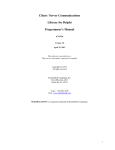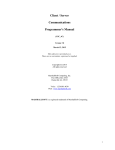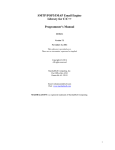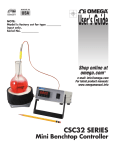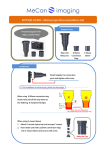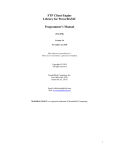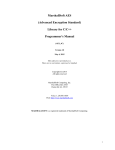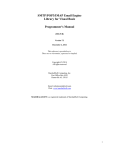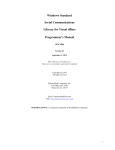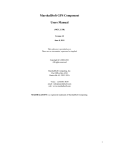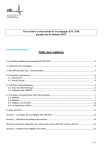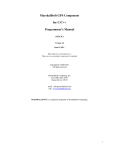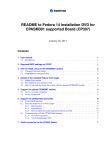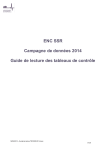Download CSC4XB Programmer`s Manual (XBase++)
Transcript
Client / Server Communications
Library for Xbase++
Programmer's Manual
(CSC4XB)
Version 7.0
April 7, 2015
This software is provided as-is.
There are no warranties, expressed or implied.
Copyright (C) 2015
All rights reserved
MarshallSoft Computing, Inc.
Post Office Box 4543
Huntsville AL 35815
Voice: 1.256.881.4630
Web: www.marshallsoft.com
MARSHALLSOFT is a registered trademark of MarshallSoft Computing.
1
TABLE OF CONTENTS
1 Introduction
1.1 Features
1.2 Documentation Set
1.3 Example Program
1.4 Installation
1.5 Uninstalling
1.6 Pricing
1.7 Updates
2 CSC Library Overview
2.1 Dynamic Link Libraries
2.2 Keycode
2.3 Win32 STDCALL and DECLSPEC
2.4 Example Protocol
2.5 Adding CSC4XB to a Project
2.6 INCLUDE Files
2.7 Error Display
3 Compiler Issues
3.1 Compiling and Linking Programs
3.2 Xbase++ Compiler
3.3 Compiling CSC Source
4 Xbase++ Example Programs
5 Revision History
Page
Page
Page
Page
Page
Page
Page
Page
Page
Page
Page
Page
Page
Page
Page
Page
Page
Page
Page
Page
Page
Page
3
4
6
6
7
7
7
7
8
8
8
8
9
10
10
10
11
11
11
11
12
14
2
1 Introduction
The Client / Server Communications Library for Xbase++ (CSC4XB) is a toolkit that allows software
developers to quickly create server and client TCP/IP and UDP applications in Alaska Xbase++
The Client / Server Communications Library (CSC) is a component DLL library used to create server
and client programs that can communicate with each other across any TCP/IP or UDP network such as the
Internet or a private network (intranet or LAN [local area net]). The CSC component library uses the
Windows API (Application Programmer's Interface) and Windows sockets API for all communication.
The CSC library can be used to communicate with other CSC programs or can be used to communicate
with other TCP programs such as DNS, POP3, SMTP, FTP, HTTP, etc. CSC can also be used to connect
to devices such as a relay device, scale device, GPS device or embedded computer device that is controlled
by sending commands to its TCP IP address.
The Client / Server Communications Library for Xbase++ (CSC4XB) component library supports and
has been tested with Alaska Xbase++ version v1.3 through Xbase++ v1.9. CSC4XB includes several
Xbase++ example programs demonstrating client/server protocols, including examples that connect to
HTTP (web) and POP3 servers as well as encrypt files. CSC can be used with the MarshallSoft AES
Advanced Encryption Library (AES4XB) if strong encryption is desired.
CSC4XB runs under all versions of Windows (95/98 /2000/2003/2008/2012/NT/XP/Vista/Win7/Win8). A
Win32 DLL is provided (a 64-bit DLL is available). The Client / Server Communications Library SDK
DLL (CSC32.DLL/CSC64.DLL) can also be used from any language (Visual C++, .NET, Visual Basic,
VB.NET,ACCESS, EXCEL, VBA, Delphi, COBOL, Visual dBase, etc.) capable of calling the Windows API.
The Client/Server Communications Programmer’s Manual provides information needed to compile
programs using CSC in an Xbase++ programming environment.
When comparing the Client/Server Communications Library against our competition, note that:
CSC is a standard Windows DLL (NOT an OCX or ActiveX control) and is much smaller than a
comparable OCX or ActiveX control.
Win32 DLL is included.
CSC does NOT depend on ActiveX or Microsoft Foundation Class (MFC) or similar "support"
libraries.
CSC is fully thread-safe.
CSC functions can be called from applications not capable of using controls.
MarshallSoft also has versions of the Client/Server Communications Library for C/C++ (CSC4C),
Visual Basic (CSC4VB), Delphi (CSC4D), Visual FoxPro (CSC4FP), dBase (CSC4DB), and Xbase++
(CSC4XB). Each version of CSC uses the same DLL (CSC32.DLL/CSC64.DLL). However, the examples
provided for each version are written for the specified programming language.
All versions of the Client/Server Communications Library (CSC) can be downloaded from our web site at
http://www.marshallsoft.com/client-server-communication.htm
Our goal is to provide a robust communication component library that you and your customers can depend
upon. A fully functional evaluation version is available. Contact us if you have any questions.
3
1.1 Features
Some of the many features of the Client/Server Communications Library component are as follows:
Supports both 32-bit and 64-bit Windows.
Supports both UDP and TCP protocols.
Can be used to create both client and server programs.
Supports "one time" passwords for improved security.
Can encrypt/decrypt data and files being transmitted.
Use with the Library for strong encryption.
Supports challenge response authentication.
Can send a Windows message when a connection is ready to accept.
Can send a Windows message when incoming data is ready to be read.
Can send and receive data buffers or entire files.
Servers can handle multiple connections concurrently.
Supports secure and private messaging.
Create chat server and clients.
Create client / server file transfer programs.
Can connect to a device such as a relay device, scale device, GPS device or embedded computer
device that is controlled by sending commands to its TCP IP address.
Create client programs to talk to TCP servers (POP3, IMAP, HTTP, SMTP, DNS)
Create SMTP proxy programs extracting a copy of all recipient addresses
Create POP3 proxy programs that filter incoming email for Spam
Create HTTP proxy used to filter content
Specify the maximum number of connections that the server will accept.
Allows multiple servers and clients to run simultaneously.
Royalty free distribution with your compiled application.
Evaluation versions are fully functional. No unlock code is required.
Is fully thread safe.
Detailed knowledge of Winsock and TCP/IP is not needed.
Supports Windows 95/98/Me/NT/2000/2003/2008/2012/XP/Vista/Window 7/Windows 8.
Works with all versions of 32-bit Xbase++, from V1.3 through V1.9.
Does not depend on support libraries. Makes calls to core Windows API functions only.
Can be used with any program (in any language) capable of calling Windows API functions.
Can be purchased with (or without) ANSI C source code.
Updates are free for one year (Source code updates are separate).
License covers all programming languages.
Free unlimited one-year technical support for registered users.
Documentation online as well as in printable format.
4
A selection of Xbase++ example programs with full source code is included. Refer to Section 6 for more
details on each of the example projects.
SendUDP
RecvUDP
Client
Control
cscVer
Download
FileGet
FilePut
Form
Pop3Stat
Server
uNetTime
Transmits a UDP data packet to RecvUDP.
Receives multicast UDP packets from SendUDP.
Simple client example program.
Sends command to the IP address of a device.
Displays CSC version and build
Downloads text file from HTTP (web) server.
File server example that encrypts files.
File client example that decrypts files.
Form that displays CSC version and build.
Gets # emails waiting on POP3 server.
Server example program.
UDP client gets Network Time.
5
1.2 Documentation Set
The complete set of documentation consists of three manuals. This is the first manual (CSC_4XB) in the
set.
CSC4XB Programmer’s Manual (CSC_4XB.PDF)
CSC User’s Manual (CSC_USR.PDF)
CSC Reference Manual (CSC_REF.PDF)
The CSC_4XB Programmer’s Manual (CSC_4XB) is the language specific (Xbase++) manual. All
language dependent programming issues are discussed in this manual. Information needed to compile
programs in an Xbase++ environment is provided in this manual. Examples programs are also discussed.
The CSC User’s Manual (CSC_USR) discusses language independent issues. Information on Client /
Server protocols as well as purchasing and license information is provided in the manual.
The CSC Reference Manual (CSC_REF) contains details on each individual CSC function.
All manuals can be viewed online at
http://www.marshallsoft.com/csc4xb.htm
1.3 Example Program
The following code segment attempts to connect to the server.
* attach DLL (allocating 1 data socket)
if XcscAttach(1, 0, CSC_KEY_CODE) < 0
?"ERROR: Bad Key Code!"
return
endif
* get version & build
nVersion = XcscGetInteger(-1, CSC_GET_VERSION)
* compute CSC version
A = int(nVersion / 256)
nVersion = nVersion - (256 * A)
B = int(nVersion / 16)
C = nVersion - (16 * B)
? "CSC Ver "+LTRIM(Str(A))+"."+LTRIM(Str(B))+"."+LTRIM(Str(C))
* get build
nBuild = XcscGetInteger(-1, CSC_GET_BUILD)
? "CSC Bld " + Ltrim(Str(nBuild))
return
Also see the example programs in the \CSC4XB\APPS sub-directory where CSC4XB was installed.
6
1.4 Installation
(1) Before installation of CSC4XB, Xbase++ should already be installed.
(2) Unzip CSC4XB70.ZIP (evaluation version) or CSCxxxxx.ZIP (registered version: xxxxx is the
Customer ID) using any Windows unzip program.
(3) Run the installation program SETUP.EXE which will install all CSC4XB files. SETUP will also copy
CSC32.DLL to the Windows directory. Note that no DLL registration is required.
1.5 Uninstalling
Uninstalling CSC4XB is very easy. First, delete the CSC4XB project directory created when installing
CSC4XB. Second, delete CSC32.DLL from the Windows directory, typically C:\WINDOWS for
Windows 95/98/2003/2008/2012/XP/VISTA/Win7/Win8 or C:\WINNT for Windows NT/2000.
1.6 Pricing
A developer license for the Client/Server Communications Library can be purchased for $115 USD (or
$195 USD with source code [ANSI C] to the library DLL). Purchasing details can be found in Section 1.4,
"How to Purchase", of the CSC User’s Manual (CSC_USR). CSC can also be purchased together with the
MarshallSoft AES Encryption Library (AES) for $175 (USD), or $275 (USD) with ANSII C source
code.
Also see INVOICE.TXT or http://www.marshallsoft.com/order.htm
1.7 Updates
When a developer license is purchased for CSC, the developer will be sent a registered DLL plus a license
file (CSCxxxxx.LIC). The license file can be used to update the registered DLL for a period of one year
from purchase. Updates can be downloaded from
http://www.marshallsoft.com/update.htm
After one year, the developer license must be updated to be able to download updates. The license can be
updated for:
$30 if the update is ordered within one year of the original purchase (or previous update).
$55 is the update is ordered between 1 and 3 years of the original purchase (or previous update).
$75 if the update is ordered after three years of the original purchase (or previous update).
The update price includes technical support for an additional year. Note that the registered DLLs, (CSC32.
DLL and CSC64.DLL) never expire. If source code was previously purchased, updates to the source code
can be purchased for $40 along with the license update.
7
2 CSC Library Overview
The Client/Server Communications Library (CSC) has been tested on multiple computers running
Windows 95/98, Windows Me, Windows NT4, Windows 2000, Windows 2003, Windows 2012, Windows
XP, Windows Vista, Windows 7 and Windows 8.
The CSC4XB library will work with all versions of 32-bit Xbase++. The CSC32.DLL functions may be
called by any Windows application program capable of calling the Windows API provided that the proper
declaration file is used. CSC64.DLL is available to use with Win64 applications.
The SETUP installation program will copy the Lib’s and DLL to the Windows directory. Refer to Section
1.4 "Installation". After SETUP is run, the CSC4XB files are copied to the directory specified (default
\CSC4XB). Three sub-directories are created, as follows:
DOCS – All documentation files
APPS – All example code
DLLS – All DLL’s
2.1 Dynamic Link Libraries
The Client/Server Communication Library component is a Win32 dynamic link library (DLL). A DLL
is characterized by the fact that it need not be loaded until required by an application program and that only
one copy of the DLL is necessary regardless of the number of application programs that use it. Contrast
this to the traditional static library that is bound to each and every application that uses it at link time.
An important advantage that DLLs have over other "popular" library formats such as VBX or OCX is that
DLLs are callable by all Windows applications. Since DLLs are the building blocks of the Windows
Operating System, they will not be replaced by a "newer technology".
2.2 Keycode
CSC32.DLL has a keycode encoded within it. The keycode is a 9 or 10 digit decimal number (unless it is
0), and will be found in the file KEYCODE.CH. The keycode for the evaluation version is 0. You will
receive a new key code when registering and a new CSC32.DLL. The KEYCODE is passed to cscAttach.
The keycode is not the customer ID (which is a 4 or 5 digit number).
If an error message (value -74) is returned when calling cscAttach , it means that the keycode in the CSC
application does not match the keycode in the DLL. After registering, it is best to remove the evaluation
version of the CSC32.DLL from the Windows search.
2.3 Win32 STDCALL and DECLSPEC
CSC32 is written in ANSI C and is compiled using the _stdcall and _declspec keywords. This means that
CSC32 uses the same calling conventions and file naming conventions as the Win32 API. In particular,
function names are NOT decorated. There are no leading underscores or trailing "@size" strings added to
function names.
The CSC32.DLL functions may be called from any Windows application program capable of calling the
Windows API provided that the proper declaration file is used.
8
2.4 Example Protocol
Several of the Client/Server Communications Library demonstration programs use the following
example protocol:
(1) The server must be running first at a specified IP address using a specified port number known to both
client and server. A host name may be used instead of an IP address. The server waits for a connection
attempt by a client.
(2) The client attempts to connect to the server.
(3) The server accepts the connection from the client, and then sends its greeting message, such as:
"CSC Example Server"
(4) The client receives the server's greeting message.
(5) The client sends a request (command) string to the server.
(6) The server receives the client's request.
(7) The server sends back its response string.
(8) Repeat steps (5), (6), and (7) until done.
(9) The client closes its connection to the server.
The server responds with the following response strings when presented with the corresponding requests
(REQ) from the client:
REQ
Response String
Request Example
Response Example
WHO
VER
BYE
ECHO
Sends name of the server.
Sends server version #.
OK (then disconnects)
Sends string after "ECHO "
WHO
VER
BYE
ECHO Hello
SERVER
7.0
OK
Hello
The above protocol is just an example. The programmer can create whatever protocol is required. Request
strings can be any length, although it is best to keep them as short as possible..
Also refer to PROTOCOL.TXT in the \CSC4XB\APPS directory.
9
2.5 Adding CSC4XB to a Project
It is straightforward to add CSC to Xbase++ programs. First, add
#INCLUDE "KEYCODE.CH"
#INCLUDE "CSC32.CH"
after any other $INCLUDE statements in the Xbase++ program.
Then add
nCode = cscAttach(1 CSC_KEY_CODE)
If nCode < 0 Then
? "Cannot attach CSC"
return
endif
as the first executed CSC function.
The keycode (contained in KEYCODE.CH) is 0 for the evaluation version and is a 9-digit number for the
purchased version. Rather than include KEYCODE.CH as shown above, the keycode can be pasted
directly into the call to seeAttach.
Lastly, link your program with CSC32.LIB. Refer to the example programs in the CSC4XB/APPS
subdirectory.
2.6 INCLUDE Files
All example programs include two files: KEYCODE.CH and CSC32.CH. The file CSC32.CH contains all
the necessary constants and function declarations for CSC4XB, while the file KEYCODE.CH contains your
keycode (license key), as discussed in Section 2.2.
The Alaska Xbase++ include file DLL.CH is also required. For example,
#INCLUDE "DLL.CH"
#INCLUDE "KEYCODE.CH"
#INCLUDE "CSC32.CH"
The above files can be copied to the Xbase++ INCLUDE directory (where Xbase++ can find it) if so
desired.
Note that each function is declared with the prefix character of 'X'
2.7 Error Display
The error message text associated with CSC error codes can be displayed by calling cscErrorText.
Each sample program contains examples of error processing.
Also see the file cscErrors.txt for a list of all CSC error codes
10
3 Compiler Issues
CSC4XB has been compiled and tested with Alaska Xbase++ versions v1.3 through and Xbase++ v1.9.
The SETUP installation program will copy the Lib’s and CSC32.DLL to the Windows directory. Refer to
Section 1.4 "Installation".
3.1 Compiling and Linking Programs
Before compiling any of the example programs, edit each program with your TCP/IP parameters, as shown
in the example program in Section 1.3 above. Server names can be IP addresses (in decimal dot notation)
or the host name.
More details on each of the example programs are provided in Section 4.0, “Example Programs.
To compile and link console mode programs, such as SERVER.PRG, use
XPP SERVER.PRG
ALINK SERVER.OBJ CSC32.LIB
To compile and link windows GUI programs, such as FORM.PRG, use
XPP FORM.PRG
ALINK /SUBSYSTEM:WINDOWS FORM.OBJ CSC32.LIB
3.2 Xbase++ Compiler
If you don't have the Alaska Software Xbase++ compiler, you can find it on the web at
http://www.alaska-software.com
3.3 Compiling CSC Source
The source code for the CSC DLL is written in standard ANSI C (CSC32.C), and has been compiled using
Microsoft Visual C++. The Win32 version is compiled with the STDCALL and DECLSPEC compiler
keywords. Source code for the CSC library can be purchased at the same time as a CSC developer license
is purchased.
CSC may also be compiled using Borland C/C++ or Watcom C/C++ compilers. If you recompile
CSC32.C is compiled using Borland or Watcom compilers, the resulting DLL can only be used by
applications compiled with the same compiler, unless the STDCALL and DECLSPEC keywords are
specified.
For more information on the C/C++ version of CSC, download the latest version of CSC4C from our web
site at http://www.marshallsoft.com/csc4c.htm.
11
4 Xbase++ Example Programs
Edit programs, such as CLIENT.PRG, with your TCP/IP email parameters before compiling
Before writing your own programs, compile and run several of the example programs.
Refer to Section 3.2 above for information on compiling and linking the example programs.
4.1 CSCVER
The CSCVER ("CSC Version") example program (CSCVER.PRG) displays the CSC version number.
This is the first program to compile and build since it verifies that CSC32.DLL is installed properly.
4.2 Client
The CLIENT example program (CLIENT.PRG) operates as a client that connects to the example server
program (SERVER). Edit CLIENT.PRG with your host name or server’s IP address before compiling.
Start the CLIENT program after the SERVER program.
4.3 Server
The SERVER example program (SERVER.PRG) operates as a server that accepts connections from the
example client program (CLIENT). Edit SERVER.PRG with your host name or IP address before
compiling.
4.4 Download
The Download example client program (Download.PRG) connects to the MarshallSoft web site (HTTP
server) and downloads a file from the ./files directory.
4.5 Form
The Form example form program (FORM.PRG) displays the CSC version and build number when the
command button is pressed.
4.6 uNetTime
uNetTime is an example UDP client that connects to a Network Time Server (on well known port 37) and
gets the network time (seconds since 1 January 1900 GMT) from the server. The default server is
time-A.timefreq.bldrdoc.gov
4.7 Control
Control is an example program that sends a byte command to a device such as
1. Relay Devices
2. Scale Devices
3. GPS Receivers
4. Embedded Computer Devices
that is controlled by sending commands to its TCP IP address.
12
4.8 Pop3Stat
The Pop3Stat example client program (Pop3Stat.PRG) logs onto a POP3 account and returns the number
of emails waiting. Edit Pop3Stat.PRG with the POP3 server name, user name and password before
compiling.
4.9 FileGet
The FileGet example program (FileGet.PRG) operates as a SERVER, and receives files from the FilePut
client. Files are decrypted when received. Edit FileGet.PRG with the host name or server IP address before
compiling. Start FileGet before FilePut.
4.10 FileGetX
The FileGetX example program (FileGetX.PRG) operates as a SERVER, and receives files from the FilePutX
client. Files are decrypted when received. Edit FileGetX.PRG with the host name or server IP address before
compiling. Start FileGetX before FilePutX.
FileGetX uses the cscGetFileExt function (see section 2.10 in CSC Users Manual).
4.11 FilePut
The FilePut example program (FilePut.PRG) operates as a CLIENT, and sends files to the FileGet server.
Files are encrypted when sent. Edit FilePut.PRG with the host name or server IP address before compiling.
Start FileGet (the server) before FilePut.
4.12 FilePutX
The FilePutX example program (FilePutX.PRG) operates as a CLIENT, and sends files to the FileGetX server.
Files are encrypted when sent. Edit FilePutX.PRG with the host name or server IP address before compiling.
Start FileGetX (the server) before FilePutX.
FilePutX uses the cscPutFileExt function (see section 2.10 in CSC Users Manual).
4.13 SendUDP
SendUDP is a console mode program that transmits a UDP data packet. It is used to test the RecvUDP
program.
4.14 RecvUDP
RecvUDP is a console mode program that receives multicast UDP data packets. Test using the SendUDP
program.
13
5 Revision History
CSC32.DLL is written in ANSI C. All language versions of CSC (C/C++, Visual Basic, Delphi, Visual
FoxPro, and Xbase++) use the same DLL.
Version 6.0: August 26, 2009
Initial Xbase++ release of CSC.
Version 6.1: October 7, 2010
Fixed: cscCreateUDP not saving socket so not closed later.
Changed: default connect timeout from 60 seconds to 10 seconds.
Changed: Pass RotateCount < 0 to cscResponse to return rightmost 31 bits of encrypted binary value.
Fixed: vSock slot freed when connect fails.
Added: cscReadSize() returns # bytes ready to be read.
Added: cscMakeDotted4() function (constructs dotted IP address from components).
Added: Control.prg example program (direct TCP control of external relay).
Version 6.2: February 29, 2012
Added function cscMakeDotted4()
Corrected Julian date function
Added additional diagnostics (to detect congestion) in csc-vs.c
Fixed cscReadSize(), worked only for vSock 0.
Fixed CSC_SET_TIMEOUT_VALUE not being passed to csc-vs
Fixed cscChallenge uses leading zeros to pad to 8 chars
Changed DEFAULT_PACKET_TIMEOUT to 35000
Added error text for VS_* errors.
Added functions cscPutFileExt & cscCryptoPutFileExt
Added functions cscGetFileExt & cscCryptoGetFileExt
Fixed problem receiving file with same name from two clients
Version 6.3: June 20, 2013
Added new example programs that use AES (Advanced Encryption Standard).
Fixed: cscCryptoGetFileExt & cscCryptoPutFileExt not using local file path.
Changed cscFillRandom(*,*,0) to use random seed rather than passed seed.
cscSetInteger (Port, CSC_SET_CLOSE_TIMEOUT, Tics) sets max ticks before socket is forced
closed.
Version 7.0: April 7, 2015
Added cscMulticast() that receives multicast UDP packets.
Added cscClientExt() that binds to a local IP address (for multi-homed computers)
Fixed bogus CSC_BAD_OFFSET error sometimes returned by crcCryptoPutFile().
14














